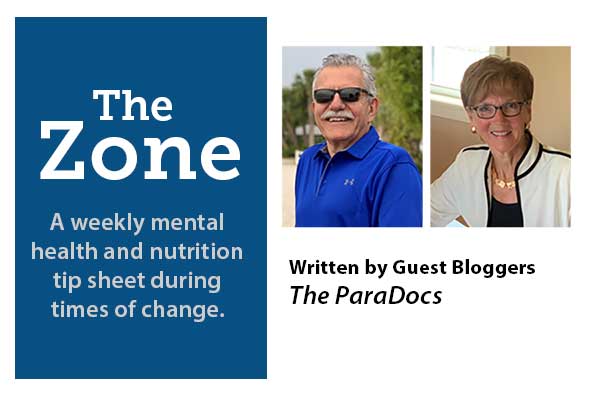Have you tried to establish a practice of Cognitive Reframing? Here are a few more tips on how to grow this practice.
In Volume 35 of this guest series, psychotherapist, Dr. Francis L. Battisti, and nutritionist, Dr. Helen Battisti, explain how awareness and change are key to the success of Cognitive Reframing.
For over 10 years, they have worked closely with us on aging concerns and have presented many webinars and in-person workshops. Their newsletter, The Zone, is a weekly mental health and nutrition tip sheet during times of change.
This week’s The ZONE is a continuation to last week’s content about Cognitive Reframing/Restructuring. This concept is useful when we recognize how our thoughts and beliefs affect our emotional states, physical conditions, and behaviors.
We have found it useful to view this concept as the A-B-C theory. The “A” is the Activating Event, the “B” is the Belief about the activating event and the “C” is the Consequence. For example, the “A” can be eating three pieces of pie or more on Thanksgiving Day which is typically a day of celebration. The “B” may be that because I over ate, I am a terrible, glutenous, irresponsible, bad person. The “C” is, we feel stressed and terrible about ourselves for the rest of the day and beyond. The beliefs about the activating event (A) are what make it stressful. Another way to frame our belief (B) is, on this day of celebration, I choose to embrace the creation of these pies and other foods that reflect the love and traditions of our family and, the consequence (C) may be the feeling of joy and less stress.
The implementation of Cognitive Reframing/Restructuring includes awareness and change. Awareness involves learning to recognize the negative and automatic thoughts and, dysfunctional beliefs and noting how these thoughts and beliefs affect our emotional states, physical conditions and behaviors. The change involves becoming aware of this cycle of events and then, if we choose, it is possible to restructure some of the automatic thoughts which will serve to change the way we think, feel, and our behaviors.
- Our beliefs (B), not the activating event (A), is what creates the consequence (C).
- Becoming aware of our negative beliefs and dysfunctional thoughts can lead to reducing our stress.
- Using the A-B-C theory can help us reframe the future.
- Embrace our traditions and celebrations.
- Replace old, negative mind chatter with positive thoughts and ideas.
- Stop – Breathe – Reflect and Choose.
- Fortune telling.
- Thinking that there are “good” and “bad” foods.
- Awfulizing.
In summary, cognitive reframing/restructuring offers the possibility of experiencing additional joys of the day. We can change, if we desire, some of our thoughts and beliefs once we are aware of their consequences.
Quote of the Week
“The greatest weapon against stress is our ability to choose one thought over another.”
–William James

